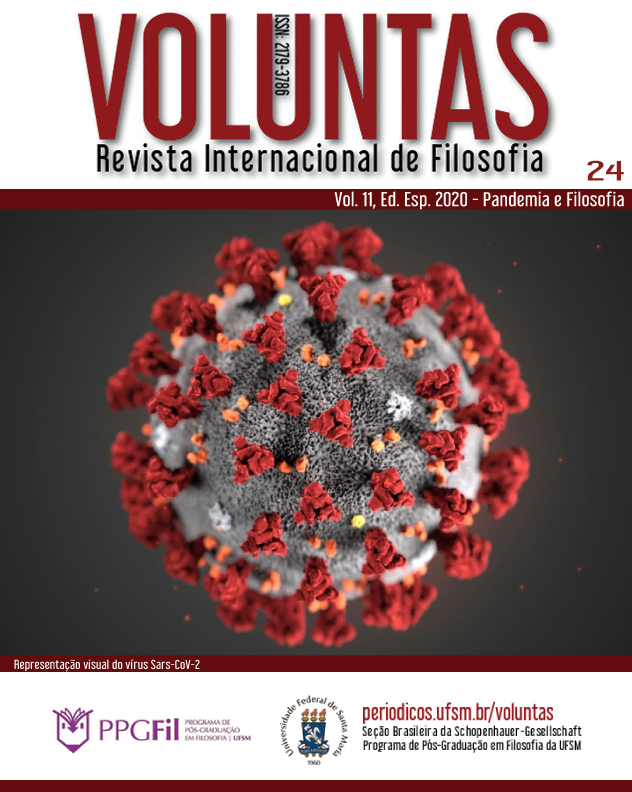Contamination of lifeworld: which philosophy rises from a sneeze?
DOI:
https://doi.org/10.5902/2179378643943Keywords:
Neoliberalism, Time diagnosis, Crisis, LegitimationAbstract
What kind of reflection can philosophy make about a pandemic? In view of the unique character of COVID-19, I propose a reading in terms of a functional analysis of the crises. To arrive at this, I first make a broader assessment of what is common to our time, presenting it in terms of a process of consolidation and expansion of neoliberalism as a “central normative grammar” for the organization and reproduction of social reproduction systems and acting in a colonizing manner on the processes of symbolic reproduction of society. The presentation of neoliberalism intends to emphasize that, before the pandemic, we were already in crisis and that, therefore, we would need a first description of this “state of affairs”. Then, I analyze the functional character of late capitalist societies to conclude by pointing out the learning perspectives that the crisis situation allows and how neoliberalism imposes a grammar that contaminates this potential.Downloads
References
AZMANOVA, A. Anti-capital for the XXIst Century (on the metacrisis of capitalismo and the prospects for radical politics, Philosophy and social criticism, XX, 2020
BOHMAN, J. Public deliberation: Pluralism, complexity and democracy. Cambridge: MIT Press, 1996
BORBA, E. d. Sobre a meritocracia. Dissertação (Mestrado em Filosofia). Centro de Filosofia e Ciências Humanas, Universidade Federal de Santa Catarina, 2017
BROWN, W. American Nightmare: Neoliberalism, Neoconservatism, and De-Democratization. Political Theory, 2006
BROWN, W. Undoing the demos. New York: Zone Books, 2015
CARVALHO, L. Como a pandemia pode aprofundar nossa desigualdade, 2020. Disponível em: https://www.nexojornal.com.br/colunistas/2020/Como-a-pandemia-pode-aprofundar-nossas-desigualdades. Acesso em: 29/04/2020
CESARINO, L. Coronavírus como força de mercado e o fim da sociedade? Disponível em: https://www.antropologicas-epidemicas.com.br/post/coronav%C3%ADrus-como-for%C3%A7a-de-mercado-e-o-fim-da-sociedade. Acesso em: 29/04/2020
COLLIER, S. The spatial forms and social norms of “actually existing neoliberalism. International Affairs Working Paper, Nova Iorque, Junho, 2005.
COOKE, M. Language and reason. A study of Habermas´s Pragmatics. Cambridge: The MIT Press, 1997.
HABERMAS, J. Reply. In: Honneth, A; Joas, H. (Orgs) Communicative Action – Essays on Jürgen Habermas´s The theory of communicative action. Cambridge: MIT Press, 1991.
DARDOT, P; LAVAL, C. A nova razão do mundo. São Paulo: Editora Boitempo, 2016
FRASER, N. The end of progressive neoliberalism. Dissent, primavera, 2017
FRASER, N. Crise de legitimação? Sobre as contradições políticas do capitalismo financeirizado. Cadernos de filosofia alemã, vol. 23, n. 2, 2018
FOUCAULT, M. Segurança, território, população. São Paulo: Martins Fontes, 2008
HABERMAS, J. A nova obscuridade. São Paulo: Editora da UNESP, 2011
HABERMAS, J. Legitimation crisis. Cambridge: Polity Press, 1988
HABERMAS, J. Justification and application. Cambdrige: MIT Press, 1994
HABERMAS, J. Mudança estrutural da esfera pública. São Paulo: Editora da UNESP, 2014a
HABERMAS, J. Na esteira da tecnocracia. São Paulo: Editora da UNESP, 2014
HABERMAS, J. O discurso filosófico da modernidade. São Paulo: Martins Fontes, 2002
HABERMAS, J. Para a reconstrução do materialismo histórico. São Paulo: Editora da UNESP, 2015
HABERMAS, J. The Postnational constelattion. Cambridge: MIT Press, 2001
HABERMAS, Jürgen. Teoria do Agir Comunicativo – Sobre a crítica da razão funcionalista (volume II). São Paulo: Editora da WMF Martins Fontes, 2012
HARTMANN, M.; HONNETH,. Paradoxes of capitalism. Constellations, v. 13, n. 1, p. 41-58, 2006
HEATH, J. Legitimation crisis’ in the later work of Jürgen Habermas, 2004. Disponível em: http://mapageweb.umontreal.ca/heathj/texts/legitimation.pdf , Acessado em 29/04/2020
LARNER, W. Neo-liberalism: Policy, Ideology, Governamentality. Studies in Political Economy, 63, 2000
MARX, K. Contribuição à crítica da economia política. São Paulo: Expressão Popular, 2008
PECK, J.; TICKELL, A. Neoliberalizing Spaces. Antipode, 34/3, 2002
PEREIRA, L.d.H. Student und Politik e as orignes da segunda geração da Teoria Crítica: Habermas e o diagnóstico do capitalismo tardio nos anos 60, Philósophos – Revista de Filosofia, 20(1), 2014
POLANYI, K. A subsistência do homem e ensaios correlatos. Rio de Janeiro: Contraponto, 2012
RAWLS, J. Uma teoria da justiça. São Paulo: Martins Fontes, 2008
STREECK, W. Tempo comprado: a crise adiada do capitalismo democrático. São Paulo: Editora Boitempo, 2018
WHITE, S. K. Foucault´s challenge to Critical Theory. The American Political Science Review, Vol. 80, n. 2, 1986
Downloads
Published
How to Cite
Issue
Section
License
The submission of original manuscripts to this journal implies the transference, by the authors, of the copyrights for printed and digital publication. The copyrights of a published manuscript belong ultimately to the author, and only the copyright for its first publication is reserved to the journal. Authors may only use the same results in other publications explicitly indicating this journal as the medium of the original publication.
Licence
Attribution-NonCommercial-ShareAlike 4.0 International (CC BY-NC-SA 4.0) - This license lets others remix, tweak, and build upon your work non-commercially, as long as they credit you and license their new creations under the identical terms.







